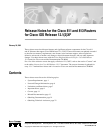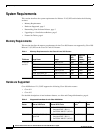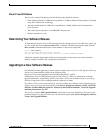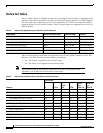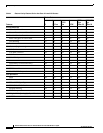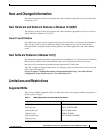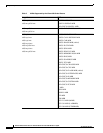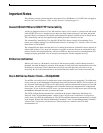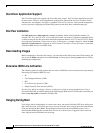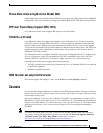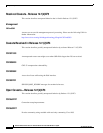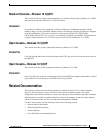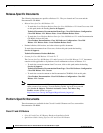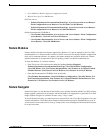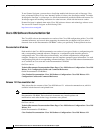
9
Release Notes for the Cisco 811 and 813 Routers for Cisco IOS Release 12.1(2)XF
78-11070-02, Rev. H0
System Requirements
Important Notes
The following sections contain important notes about Cisco IOS Release 12.1(2)XF5 that can apply to
the Cisco 811 and 813 Routers. (Also, see the “Caveats” section on page 11.)
Caveat CSCdr91706 and IOS HTTP Vulnerability
A defect in multiple releases of Cisco IOS software causes a Cisco router or switch to halt and reload
if the IOS HTTP service is enabled and you browse to http://router-ip/anytext?/ and enter the enable
password when it is requested. This defect can be exploited to produce a denial of service (DoS) attack.
This vulnerability can only be exploited if the enable password is known or not set.
The vulnerability, identified as Cisco bug ID CSCdr91706, affects virtually all mainstream Cisco
routers and switches running Cisco IOS software releases 12.0 through 12.1, inclusive. This is not the
same defect as CSCdr36952.
The vulnerability has been corrected and Cisco is making fixed releases available for free to replace all
affected IOS releases. Cisco urges all customers to upgrade to releases that are not vulnerable to this
defect as listed in the complete advisory, which is available at: http://www.cisco.com/warp/public/707/
ioshttpserverquery-pub.shtml. You are strongly encouraged to read the complete advisory.
B Channel Activation
When a call comes in, a B channel is activated. If the amount of traffic on the B channel exceeds a
threshold, the other B channel is activated. If the amount of traffic falls below the threshold, one of the
B channels is deactivated. The B channel that is initially activated when the call comes in is not
necessarily B1 nor is the B channel that is deactivated when the traffic level lessens necessarily B2.
Cisco 800 Series Router Clock—CSCdp09409
To run IPSec successfully, the Cisco 800 series router clock needs to be set accurately. Cisco 800 series
router clocks are set and maintained using Simple Network Time Protocol (SNTP). For best results, set
up a Network Time Protocol (NTP) server to periodically send time information messages to Cisco 800
series routers. See the SNTP configuration and command reference documentation for configuration
instructions. If you do not have an NTP server, you must reset the Cisco 800 series router clock using
the clock set command each time you restart the router.
The SNTP configuration documentation is available in the chapter “Monitoring the Router and
Network” in the “System Management” volume of the Configuration Fundamentals Configuration
Guide in the Cisco IOS documentation set. The SNTP command reference documentation is available
in the chapter “Router and Network Monitoring Commands” in the “System Management Commands”
volume of the Configuration Fundamentals Command Reference manual in the Cisco IOS
documentation set.



